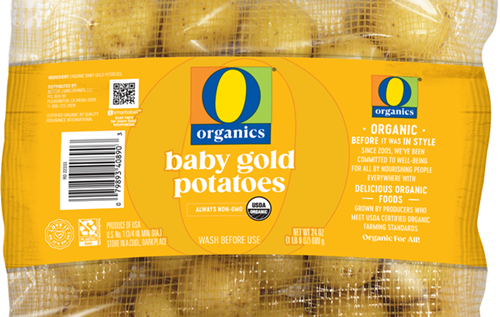Over the past few years, rising supermarket prices have forced many families to make compromises on ingredient quality when shopping for meals. A recent study published by Supermarket News found that 41% of families with children were more likely to switch to lower-quality groceries to deal with inflation.
By comparison, 29% of people without children have switched to lower-quality groceries to cope with rising prices.
Despite the current rising costs of groceries, O Organics has enabled families to consistently enjoy high-quality, organic meals at affordable prices for nearly two decades. With a focus on great taste and health, O Organics offers an extensive range of options for budget-conscious consumers.
O Organics launched in 2005 with 150 USDA Certified Organic products but now offers over 1,500 items, from organic fresh fruits and vegetables to organic dairy and meats, organic cage-free certified eggs, organic snacks, organic baby food and more. This gives families the ability to make a broader range of recipes featuring organic ingredients than ever before.
“We believe every customer should have access to affordable, organic options that support healthy lifestyles and diverse shopping preferences,” shared Jennifer Saenz, EVP and Chief Merchandising Officer at Albertsons, one of many stores where you can find O Organics products. “Over the years, we have made organic foods more accessible by expanding O Organics to every aisle across our stores, making it possible for health and budget-conscious families to incorporate organic food into every meal.”
With some help from our friends at O Organics, Upworthy looked at the vast array of products available at our local store and created some tasty, affordable and healthy meals.
Here are 3 meals for a family of 4 that cost $7 and under, per serving. (Note: prices may vary by location and are calculated before sales tax.)
O Organic’s Tacos and Refried Beans ($6.41 Per Serving)
Few dishes can make a family rush to the dinner table quite like tacos. Here’s a healthy and affordable way to spice up your family’s Taco Tuesdays.
Prep time: 2 minutes
Cook time: 20 minutes
Total time: 22 minutes
Ingredients :
1 lb of O Organics Grass Fed Ground Beef ($7.99)
1 packet O Organics Taco Seasoning ($2.29)
O Organics Mexican-Style Cheese Blend Cheese ($4.79)
O Organics Chunky Salsa ($3.99)
O Organics Taco Shells ($4.29)
1 can of O Organics Refried Beans ($2.29)
Instructions :
1. Cook the ground beef in a skillet over medium heat until thoroughly browned; remove any excess grease.
2. Add 1 packet of taco seasoning to beef along with water [and cook as directed].
3. Add taco meat to the shell, top with cheese and salsa as desired.
4. Heat refried beans in a saucepan until cooked through, serve alongside tacos, top with cheese.
 O Organics Mexican-style blend cheese. via O Organics
O Organics Mexican-style blend cheese. via O Organics
O Organics Hamburger Stew ($4.53 Per Serving)
Busy parents will love this recipe that allows them to prep in the morning and then serve a delicious, slow-cooked stew after work.
Prep time: 15 minutes
Cook time: 7 hours
Total time: 7 hours 15 minutes
Servings: 4
Ingredients:
1 lb of O Organics Grass Fed Ground Beef ($7.99)
1 ½ lbs O Organics Gold Potatoes ($4.49)
three O Organics Carrots ($2.89)
1 tsp onion powder
I can O Organics Tomato Paste ($1.25)
2 cups water
1 yellow onion diced ($1.00)
1 clove garlic ($.50)
1 tsp salt
1/4 tsp pepper
2 tsp Italian seasoning or oregano
Instructions:
1. Cook the ground beef in a skillet over medium heat until thoroughly browned; remove any excess grease.
2. Transfer the cooked beef to a slow cooker with the potatoes, onions, carrots and garlic.
3. Mix the tomato paste, water, salt, pepper, onion powder and Italian seasoning in a separate bowl.
4. Drizzle the mixed sauce over the ingredients in the slow cooker and mix thoroughly.
5. Cover the slow cooker with its lid and set it on low for 7 to 8 hours, or until the potatoes are soft. Dish out into bowls and enjoy!
 O Organics baby gold potatoes. via O Organics
O Organics baby gold potatoes. via O Organics
O Organics Ground Beef and Pasta Skillet ($4.32 Per Serving)
This one-pan dish is for all Italian lovers who are looking for a saucy, cheesy, and full-flavored comfort dish that takes less than 30 minutes to prepare.
Prep time: 2 minutes
Cook time: 25 minutes
Total time: 27 minutes
Servings: 4
Ingredients:
1 lb of O Organics Grass Fed Ground Beef ($7.99)
1 tbsp. olive oil
2 tsp dried basil
1 tsp garlic powder
1 can O Organics Diced Tomatoes ($2.00)
1 can O Organics Tomato Sauce ($2.29)
1 tbsp O Organics Tomato Paste ($1.25)
2 1/4 cups water
2 cups O Organics Rotini Pasta ($3.29)
1 cup O Organics Mozzarella cheese ($4.79)
Instructions :
1. Brown ground beef in a skillet, breaking it up as it cooks.
2. Sprinkle with salt, pepper and garlic powder
3. Add tomato paste, sauce and diced tomatoes to the skillet. Stir in water and bring to a light boil.
4. Add pasta to the skillet, ensuring it is well coated. Cover and cook for about 10 minutes, stirring occasionally.
5. Remove the lid, sprinkle with cheese and allow it to cool.
 O Organics tomato basil pasta sauce and extra virgin olive oil. via O Organics
O Organics tomato basil pasta sauce and extra virgin olive oil. via O Organics





